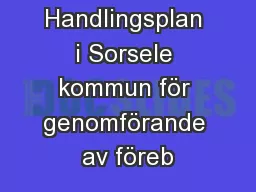PPT-Referring for a community
Author : carla | Published Date : 2023-11-19
support activity SelfGuided learning package Allied Health Professions Office of Queensland July 2021 A partnership with Neami National and Mind Australia Introduction
Presentation Embed Code
Download Presentation
Download Presentation The PPT/PDF document "Referring for a community" is the property of its rightful owner. Permission is granted to download and print the materials on this website for personal, non-commercial use only, and to display it on your personal computer provided you do not modify the materials and that you retain all copyright notices contained in the materials. By downloading content from our website, you accept the terms of this agreement.
Referring for a community: Transcript
Download Rules Of Document
"Referring for a community"The content belongs to its owner. You may download and print it for personal use, without modification, and keep all copyright notices. By downloading, you agree to these terms.
Related Documents














